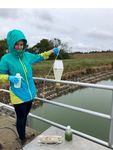PFAS Sampling to be Conducted at Ohio Public Water Systems - Ohio.gov
←
→
Page content transcription
If your browser does not render page correctly, please read the page content below
Winter 2019/2020
PFAS Sampling to be Conducted at Ohio Public Volume 12, Issue 2
Water Systems
In 2019, U.S. EPA released its PFAS action plan which prompted many states to
take additional actions, including initiating sampling to determine levels of PFAS in INSIDE THIS ISSUE
drinking water. On Sept. 27, 2019, Governor Mike DeWine announced the
establishment of an inter-agency workgroup to address the emerging issue of PFAS PFAS Sampling to be
Conducted at Ohio Public
(per- and polyfluoroalkyl substances) in Ohio. In his announcement, he directed
Water Systems……………...1
the Ohio Environmental Protection Agency (Ohio EPA) and Ohio Department of
Health (ODH) to work together on developing a statewide PFAS action plan to H2Ohio—A Collaborative
address potential threats to both public and private drinking water systems. On Approach to the Issues
Dec. 2, 2019, the State of Ohio released the statewide action plan. The plan calls for Facing Ohio’s Water……...2
Ohio EPA to gather data from public water systems statewide to determine if PFASs
Fluoridation Assistance
are present in drinking water. Program…………….………...2
Under the plan, Ohio EPA will coordinate sampling of
Meet Ohio EPA Staff—New
approximately 1,500 community and nontransient to DDAGW..………………....3
noncommunity public water systems statewide. Raw
and finished water (entry point) samples will be Meet the Water System —
collected at these public water systems, with a goal of Southwest Licking
completing all sampling efforts by the end of 2020. Community Water & Sewer
District ………….…………….4
Public water system sampling efforts, coordinated by
Ohio EPA under contracts with qualified consultants Harmful Algal Bloom
and laboratories, will begin in February. Some Technical Assistance……...5
sampling may also be conducted by trained Exam Info 2020………….…5
technicians from Ohio EPA and analysis performed by
Ohio EPA’s Division of Environmental Services Rulemaking
(DES). Approved U.S. EPA methods will be used for Activities………………….......6
analysis. Ohio EPA and consultants will contact public Receive the Spigot News
water systems to arrange sampling. PFAS sampling and More...…………............6
results for public water systems will be publicly
accessible on Ohio’s PFAS webpage.
There are currently no national drinking water standards for PFAS compounds.
In 2016, U.S. EPA set health advisory levels (HALs) of 70 parts per trillion (ppt) for
two of the most studied PFAS chemicals, PFOA and PFOS. Ohio’s action plan
includes the use of these HALs for PFOA and PFOS and establishes additional
action levels for four additional chemicals in the PFAS family, including GenX, 24-HOUR
PFBS, PFHxS, and PFNA. The establishment of national drinking water maximum EMERGENCY HOTLINE
contaminant levels (MCLs) is under consideration by U.S. EPA.
For emergencies occurring
A PFAS toolkit has been developed to assist public water system communication
after 5 p.m. on a weekend or
efforts. The toolkit as well as more information about PFAS, the action plan, and
holiday, please call Ohio
additional resources are available at pfas.ohio.gov. EPA’s emergency hotline at
(800) 282-9378.
Ohio Environmental Protection Agency ~ Division of Drinking and Ground WatersH2Ohio - A collaborative approach to the issues facing Ohio’s water
The H2Ohio Fund was proposed by Governor DeWine in March 2019 to invest in targeted solutions to help
insure safe and clean water for Ohioans across the state. Through the budget bill, the General Assembly invested $172
million in the plan.
In November 2019, Governor DeWine announced the full details of the plan,
which is being implemented by The Ohio Lake Erie Commission, Ohio EPA, Ohio
Department of Agriculture and Ohio Department of Natural Resources.
H2Ohio will focus on:
• Reducing phosphorus in Lake Erie and elsewhere through farming best
practices;
• Creating new wetlands to reduce excessive nutrients entering lakes and
rivers;
• Addressing failing home sewage treatment systems in disadvantaged
communities;
• Preventing lead contamination in water at daycares and schools.
In regard to drinking water systems, Ohio EPA utilized the project priority
lists of the well established, state revolving loan (SRF) program to identify
projects to help fund for this first year of H2Ohio. Ohio EPA looked for shovel-
ready projects where H2Ohio funding could be used right away.
The H2Ohio Program has enabled Ohio EPA to extend its principal
forgiveness dollars to help more communities to address their drinking water
and sewer needs.
Fluoridation Assistance Program
Ohio Department of Health
Making fluoridated water FAP assists public water Please visit the Fluoridation
available to Ohioans is an supply systems by reimbursing a Assistance Program website1 or
important step a community can portion of the cost to purchase Ohio EPA’s Financial Assistance
take to improve the dental health new or replacement fluoridation page2 to learn more about this
of its residents. This effective, equipment and/or supplies. The program. If you anticipate
economical, legal, and safe public program offers financial initiating water fluoridation or
health measure can be assistance to community water needing to replace your
implemented at minimal cost systems that fluoridate to help fluoridation feeding and testing
through the Ohio Department of offset the costs of replacing equipment in 2020, please email
Health’s (ODH) Fluoridation fluoridation feeding and testing Barbara.Carnahan@
Assistance Program (FAP). The equipment. Communities that are odh.ohio.gov.
purpose of FAP is to provide interested in initiating water
financial and technical assistance fluoridation may be eligible to
to communities, enabling them to receive reimbursement for start- 1 https://odh.ohio.gov/wps/
fluoridate their water systems to up costs, including the first year's portal/gov/odh/know-our-
programs/oral-health- program/
the optimum level necessary to supply of fluoride supplement. media/fluoridation-assistance-
prevent dental disease. Presently, This funding is generously offered program-application-packet
92 percent of the state’s through a grant from the Delta
population served by community Dental Foundation, and the
2 epa.ohio.gov/ddagw/
financialassistance
water systems is enjoying the amount awarded to each water
benefits of fluoridated water. system is contingent on funding
received by ODH.
Ohio EPA Spigot News ~ Winter 2019/2020 ~ Page 2Meet Ohio EPA Staff—New to DDAGW
Celeste Bronson Jodi Elam
What is your position at What is your position
Ohio EPA? at Ohio EPA?
I am an Environmental Environmental Specialist
Specialist in the Division of II for DDAGW – CDO
Drinking and Ground Waters. I
How long have you
am training to review plans, worked for Ohio
conduct sanitary surveys, and EPA?
more.
I’m still new to the
How long have you worked agency—a year in
for Ohio EPA? December. I’ve been in
This is my first full-time Ohio for about a year and
position. However, I interned a half.
for Ohio EPA during the
summer of 2018. What excites you the
most about the work
that you do or your
What excites you the most about the work that field of study?
you do or your field of study? I enjoy helping protect our drinking water quality and
I am excited to be able to help protect the health of those that every day is different. Plus, actually doing work in
around us by working to ensure compliance with the subject that I went to school for is a great feeling.
environmental regulations.
Favorite memory or accomplishment with the
Favorite memory or accomplishment with the agency or related to your field?
agency or related to your field? When I graduated with my Master in Environmental
So far, my favorite memory is getting hired for a full- Management in 2018 from Western State Colorado
time position. University.
What is your favorite thing to do outside of What is your favorite thing to do outside of
work? work?
A few of my favorite things to do outside of work include I love taking my two dogs out for walks and playing
reading, volunteering, attending church, and being with with them. We have a terrier mix named Duffy and a
family. chihuahua puppy named Chloe.
Who inspires you? Who inspires you?
Phillis Wheatly (first published woman of African My mom.
descent) and Mary McLeod Bethune (the founder of
Daytona Normal and Industrial Institute) are two
women that inspire me. I admire them for
accomplishing amazing feats while surrounded by the
direct influence of slavery. Also, I share similar morals.
Celeste and Jodi are a part of Ohio EPA’s Division of Drinking and Ground Waters in
Central District Office. CDO serves Delaware, Fairfield, Fayette, Franklin, Knox, Licking,
Madison, Marrow, Pickaway, and Union County.
Ohio EPA Spigot News ~ Winter 2019/2020 ~ Page 3Small Systems Corner
Southwest Licking Community Water & Sewer District
Southwest Licking Community Water &
Sewer District obtains its water from six
ground water wells capable of producing 2.4
million gallons of treated water. The District
currently serves over 6,000 customers in Etna
Township, Harrison Township, and portions of
the city of Pataskala. There are six water
operators at the facility.
In October 2019, the District had the grand
opening of the new York Road water treatment
plant, which employs state-of-the-art
membrane filtration treatment. Superinten-
dent and Class 3 operator CJ Gilcher has
worked for the District over 16 years. He is
extremely knowledgeable about the water
system and has enjoyed his interactions with
Ohio EPA staff. “The District’s Ohio EPA
representatives have always been great to work
with. All of the Ohio EPA staff have been
responsive to any questions that we have had. We have never felt that there was a question that couldn’t be
asked. Ohio EPA has always been helpful from permitting to process issues and everything in between,” said
Gilcher.
The District is very proud of the
collaboration between operators,
engineers, and staff in getting the
York Road treatment plant online.
Gilcher said, “The District’s Board of
Trustees and General Manager
allowed a real hands-on approach
with operations staff in the design and
construction of the facility.
“Operations staff submitted input on
plan drawings and plant specifications
every step of the way. It gave the staff
a sense of ownership and has made
the commissioning of the facility that
much easier.”
SWLCWS offers tours to the public
upon request. Contact CJ Gilcher or
Chad Sims at (740) 927-0410.
Photos of Southwest Licking Community Water & Sewer District courtesy of Infinite Impact & Aerial Image Solutions
Ohio EPA Spigot News ~ Winter 2019/2020 ~ Page 4Harmful Algal Bloom Technical Assistance
When it comes to harmful algal blooms (HABs), source water
management can be an important tool to prevent a cyanotoxin
finished water detection. HABs can be short-lived and
unpredictable. It is not uncommon for public water systems (PWS)
to experience several years without a HAB in their drinking water
source, and when problems arise, it can be difficult for PWSs to
determine the best management of their drinking water source.
Ohio EPA’s Emerging Contaminants Section (ECS), along with
district office staff, are available to provide technical assistance to
public water systems with source water HAB issues. Ohio EPA has
assisted PWSs with treatment train sampling and jar test studies to
inform treatment optimization, such as advising
dose, application location, and type of powdered
activated carbon. Similarly, source water sampling
may include cyanotoxin and cyanobacteria screening
samples, concentrated net tow samples, and
phytoplankton identification to support avoidance
and reservoir management strategies, such as
algaecide application.
When providing technical assistance at a PWS, Ohio EPA staff will meet with the operators, review
the plant and treatment process, and survey the source waters. Sampling instruments and equipment
that the PWS may use throughout the HAB season to help manage their reservoirs and other source
waters can be discussed as well. Sampling water quality parameters in the reservoir is an important
step in source water management. It helps the PWS understand what is occurring in the source water
so the PWS can better treat it and address any issues prior to the water entering the treatment plant.
Ohio EPA staff can collect concentrated plankton samples and examine phytoplankton under a
microscope, along with providing a quick introduction to microscopy and phytoplankton
identification.
Basic information on size, shape, and characteristics of cyanobacteria can be
explained to the PWS staff. Knowledge of which cyanobacteria are present and
abundant may help target algaecide use for that specific cyanobacteria.
Additionally, supplemental cyanobacteria screening (qPCR) can detect when
cyanotoxin-producing genes are present during the visit.
PWS staff can use the information and training provided during these visits to
better equip their staff with the tools and knowledge to prevent and respond to
HAB events. For more information about HABs, please visit epa.ohio.gov/
ddagw/HAB. To request technical assistance from ECS, please call (614) 644-
2752 and ask to speak with someone in the Emerging Contaminants Section.
2020 PAPER AND PENCIL EXAMS
WATER AND WASTEWATER
SPRING FALL
Application Due: Feb. 6 Application Due: Aug. 6
Exam Date: May 6 Exam Date: Nov. 4
For More Information:
Call the operator certification hotline
at 1-866-411-OPCT (6728) or visit:
epa.ohio.gov/ddagw/opcert.aspx for more information.
Ohio EPA Spigot News ~ Winter 2019/2020 ~ Page 5Rulemaking Activities
OHIO EPA’S Below is a brief summary of recent and upcoming rule changes. For more
details, including notice of opportunities to comment on draft rules, sign up for
SPIGOT NEWS
our electronic mailing list, or visit us on the web at epa.ohio.gov/ddagw.
Mike DeWine, Governor
Jon Husted, Lt. Governor
Interested Party Review (IPR)
Laurie A. Stevenson, Director • Disadvantaged Community Loans
Produced by the Division of
Drinking and Ground Waters To be filed with Joint Committee on Agency Rule Review (JCARR)
• Laboratory Certification Rules
Editor: Emma Brown
• Primary Drinking Water Standards rule 3745-81-24
Contributing Writers:
• Underground Injection Control Rules
Tya Darden, Marissa Ganzfried,
Emilie Eskridge, Celeste Filed with Joint Committee on Agency Rule Review (JCARR)
Bronson, Jodi Elam, Heidi
• Primary Drinking Water Standards
Griesmer
and Emma Brown. • Surface Water Treatment Rules
Ohio EPA is an
Equal Opportunity Employer
Receive the Spigot News and More
The Spigot News is sent only to subscribers! Sign up to receive it in
electronic form at http://ohioepa.custhelp.com/ci/documents/
detail/2/subscriptionpage. On this webpage, you can also subscribe to our
free electronic mailing service for quick and timely updates on several other
topics, including:
• Resiliency and Water Security: Emergency Management Information for
Public Works
• Harmful Algal Blooms Mailing List: Updates for Public Water Systems and
Laboratories
• DDAGW Spigot News: Newsletter for Public Drinking Water Systems
Ohio EPA • Drinking Water: Rulemaking Activity and Policy Notification
P.O. Box 1049
• Monitoring and Compliance Information
Columbus, Ohio 43216-1049
Phone: (614) 644-2752 • Underground Injection Control: Rulemaking Activity and Program
Fax: (614) 644-2909
Notification
Visit us on the web at
epa.ohio.gov/ddagw • Operator Certification Program: Drinking Water and Wastewater
Printed on Recycled Paper • Electronic Reporting: Lab Reporting or Water System Reporting
Ohio EPA Spigot News ~ Winter 2019/2020 ~ Page 6You can also read



























































